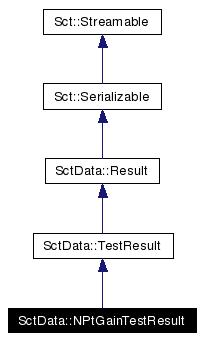
#include <NPtGainTestResult.h>
Inheritance diagram for SctData::NPtGainTestResult:


Public Member Functions | |
| NPtGainTestResult () throw () | |
| ~NPtGainTestResult () throw () | |
| NPtGainTestResult (unsigned int runNumber, const string &moduleName, const CalChargeVariable &testVariable, const ThresholdVariable &scanVariable) throw () | |
| Contructor. | |
| virtual string | getClassName () const throw () |
| Get the class name for this object. | |
| const ResponseCurve & | getResponseCurve () const throw () |
| void | setChannelDataSize (unsigned int i) throw () |
| void | setChipDataSize (unsigned int i) throw () |
| const NPtGainTestResultData & | getChipData (unsigned int chip) const throw (LogicError) |
| Get the N Pt Gain data for a channel. | |
| NPtGainTestResultData & | getChipData (unsigned int chip) throw (LogicError) |
| const NPtGainTestResultData & | getChannelData (unsigned int channel) const throw (LogicError) |
| Get the N Pt Gain data for a channel. | |
| NPtGainTestResultData & | getChannelData (unsigned int channel) throw (LogicError) |
| unsigned int | getNChipData () const throw () |
| get the number of chip fits, 0 or 12; | |
| unsigned int | getNChannelData () const throw () |
| get the number of channel fits, 0 or 1535; | |
| double | getSpecialScanPointValue () const throw (LogicError) |
| unsigned int | getSpecialScanIndex () const throw () |
| void | setSpecialScanPointValue (double pointValue) throw (LogicError) |
| Set the value of the special point. | |
| shared_ptr< TGraph > | getOffsetGraph () const |
| Access all offset data in convenient graph format. | |
| shared_ptr< TGraph > | getNoiseGraph () const |
| Access all noise data in convenient graph format. | |
| shared_ptr< TGraph > | getGainGraph () const |
| Access all gain data in convenient graph format. | |
Data Fields | |
| RangedVector< float > | noiseSlope |
| Noise slopes of the chips. | |
| RangedVector< float > | offsetSlope |
| Offset slopes of the chip data. | |
| RangedVector< float > | gainSlope |
| Gain slopes of the chip data. | |
Private Attributes | |
| unsigned int | specialScanIndex |
| The index of the special scan! | |
| RangedVector< NPtGainTestResultData > | chipData |
| The chip fits. | |
| RangedVector< NPtGainTestResultData > | channelData |
| The channel fits. | |
The difference is of course, N.
Definition at line 46 of file NPtGainTestResult.h.
|
||||||||||||||||||||
|
Contructor. Pass on all the necessary stuff to TestResult. NB the NPtGainTestResult owns the response curve. Definition at line 31 of file NPtGainTestResult.cpp. References Sct::nChannelModule, and Sct::nChipModule. |
|
|
Get the N Pt Gain data for a channel.
Definition at line 149 of file NPtGainTestResult.h. Referenced by getGainGraph(), getNoiseGraph(), getOffsetGraph(), and SctData::ISTestSummary::ISNPtGainSummaryWriter::write(). |
|
|
Get the N Pt Gain data for a channel.
Definition at line 141 of file NPtGainTestResult.h. Referenced by NPtGainCompare::compareChip(), SctData::IO::NPtGainTestResultStreamer_v2::read(), SctData::IO::NPtGainTestResultStreamer_v1::read(), SctCalibrationController::NPtGainConfigUpdater::update(), SctData::IO::NPtGainTestResultStreamer_v2::write(), and SctData::IO::NPtGainTestResultStreamer_v1::write(). |
|
|
Get the class name for this object. This is used to identify the precise type.
Implements Sct::Streamable. Definition at line 75 of file NPtGainTestResult.cpp. |
|
|
Access all gain data in convenient graph format.
Definition at line 57 of file NPtGainTestResult.cpp. References getChannelData(), and Sct::nChannelModule. Referenced by SctAnalysis::NPtGainAlgorithm::doSlopes(). Here is the call graph for this function:  |
|
|
get the number of channel fits, 0 or 1535;
Definition at line 94 of file NPtGainTestResult.h. References channelData. |
|
|
get the number of chip fits, 0 or 12;
Definition at line 89 of file NPtGainTestResult.h. References chipData. Referenced by SctData::IO::NPtGainTestResultStreamer_v2::write(), and SctData::IO::NPtGainTestResultStreamer_v1::write(). |
|
|
Access all noise data in convenient graph format.
Definition at line 48 of file NPtGainTestResult.cpp. References getChannelData(), and Sct::nChannelModule. Referenced by SctAnalysis::NPtGainAlgorithm::doSlopes(). Here is the call graph for this function:  |
|
|
Access all offset data in convenient graph format.
Definition at line 66 of file NPtGainTestResult.cpp. References getChannelData(), and Sct::nChannelModule. Referenced by SctAnalysis::NPtGainAlgorithm::doSlopes(). Here is the call graph for this function:  |
|
|
|
|
|
Definition at line 102 of file NPtGainTestResult.h. References SctData::TestResult::getTestPointAt(), and specialScanIndex. Here is the call graph for this function:  |
|
|
Set the value of the special point.
Definition at line 79 of file NPtGainTestResult.cpp. |
|
|
The channel fits.
Definition at line 137 of file NPtGainTestResult.h. Referenced by getNChannelData(), and NPtGainTestResult(). |
|
|
The chip fits.
Definition at line 136 of file NPtGainTestResult.h. Referenced by getNChipData(), and NPtGainTestResult(). |
|
|
Gain slopes of the chip data.
Definition at line 132 of file NPtGainTestResult.h. Referenced by SctAnalysis::NPtGainAlgorithm::doSlopes(). |
|
|
Noise slopes of the chips.
Definition at line 130 of file NPtGainTestResult.h. Referenced by SctAnalysis::NPtGainAlgorithm::doSlopes(). |
|
|
Offset slopes of the chip data.
Definition at line 131 of file NPtGainTestResult.h. Referenced by SctAnalysis::NPtGainAlgorithm::doSlopes(). |
|
|
The index of the special scan!
Definition at line 135 of file NPtGainTestResult.h. Referenced by getSpecialScanIndex(), and getSpecialScanPointValue(). |
 1.4.6
1.4.6